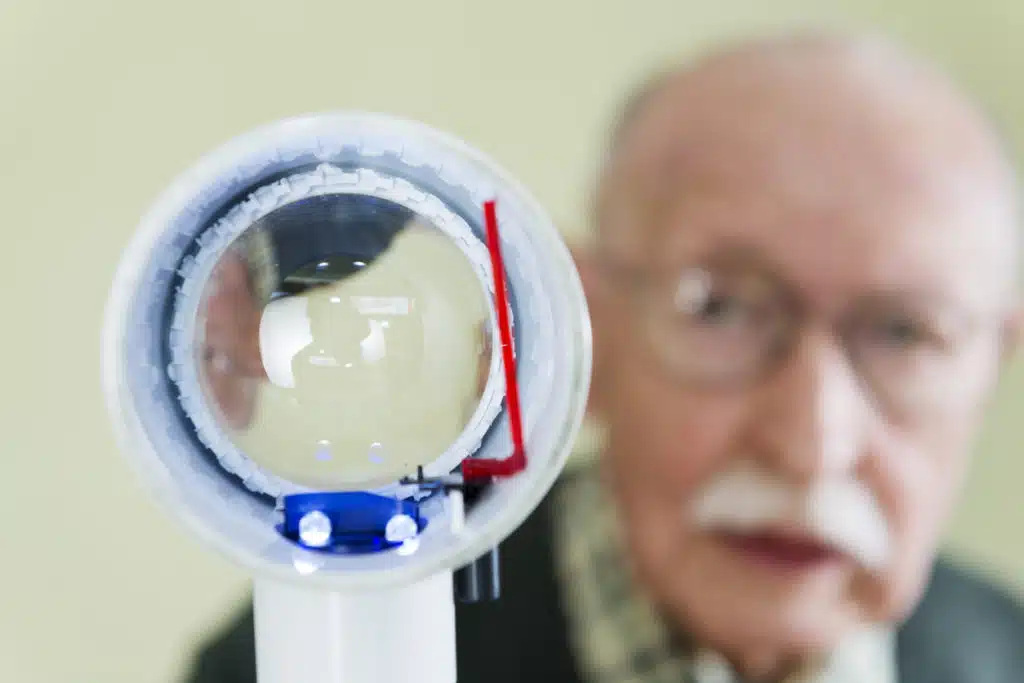
Wet macular degeneration is a version of age-related macular degeneration. It always stems from dry macular degeneration, which is common among older adults.
If this eye condition is left untreated by an eye doctor, this disorder can greatly affect the center of your vision. (You will retain your peripheral vision – that is not affected.) Fortunately, you can mitigate your risk of wet macular degeneration developing into severe central-vision impairment in one or both eyes by receiving medical treatment by a skilled ophthalmologist.
Let’s talk about the consequences that can occur due to this condition, how it can be treated and prevented from advancing, and where you can go for diagnosis and treatment by an outstanding eye doctor right here in Washington, Missouri.
How Can Wet Macular Degeneration Be Treated?
While dry macular degeneration cannot be treated, wet macular degeneration can. You can slow down or stop its progress with early treatment.
The best treatment option is anti-VEGF medication. These physician-administered injections inhibit the levels of vascular endothelial growth factors (VEGFs), which stimulate abnormal blood vessel growth. Many patients have experienced positive results from this treatment, even regaining much of their lost eyesight back.
Keep in mind that this disorder gradually and aggressively develops during its early stages, and most people do not realize they even have it until they begin to notice symptoms. Therefore, especially if you have macular degeneration in your family, be sure to see an eye doctor at least once a year for a checkup if you’re 50 or over.
What Causes Wet Macular Degeneration?
The exact cause of macular degeneration is unknown. However, experts have determined how wet macular degeneration develops.
It starts with the abnormal growth of new blood vessels beneath the retina. These may leak blood or other fluids into the eye, thus the term wet macular degeneration. Leaked blood or fluids can then interfere with the function of the macula, which is a key part of the eyesight-producing retina.
What Can Happen if I Don’t Treat Wet Macular Degeneration?
Visual Impairment
Wet macular degeneration affects our central vision, which allows us to clearly see shapes, colors, and details. Thus, you may experience any of the following visual impairments, depending on the stage of the disorder:
- Blurry or fuzzy vision
- Straight lines seen as wavy lines
- Difficulty recognizing faces, reading, and seeing colors
- Strained vision in low-light environments
- Presence of blind spots or obscured areas in the central vision
Mental Health Issues
People with an advanced form of the disorder can completely lose their central vision, making it impossible to drive a car and very difficult to read. This affliction can limit your ability to navigate your daily tasks, and for some people it can lead to social isolation and depression. It is very important to have a social network of support around you.
Charles Bonnet Syndrome
When you lose a portion of your vision, your brain tries to compensate by conjuring images that are not present in real life. These visual hallucinations are called the Charles Bonnet syndrome, which is common among patients with macular degeneration.
Eye Doctor in Washington, MO
Since there is treatment for wet macular degeneration, it’s essential to visit an eye doctor for regular checkups.
If you’re in or around the St. Louis suburb of Washington, Missouri, look no further than the Advanced Sight Center. Our board-certified ophthalmologists stay on top of the latest developments in eye health, so you can rest assured of our high quality of care.
If you have any questions or would like to schedule a consultation, contact our friendly staff today by calling us at (636) 239-1650. Alternatively, you can fill out our appointment request form for your convenience. Our clinic is centrally located on Jefferson Street in Washington, Missouri, and we look forward to serving you!




